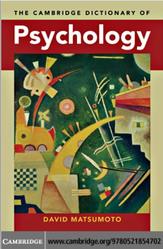It is perhaps most fitting that a dictionary of psychology begins with definitions of the terms dictionary and psychology. This is the definition of psychology presented in this work, and it highlights several important points concerning this dictionary. First, psychology is broad. Its contents range from the microlevel neural processes that form the building blocks of thought, feeling, and action to the macrolevel social and cultural processes that bind us with our primate relatives in our evolutionary history and define our collectives. For that reason, a dictionary of psychology needs to include terms and concepts related to neural structures, chemicals, transmitters, genes, and anatomy, as much as it needs to include social processes, network analysis, and cultural norms and artifacts. It also needs to include concepts related to the array of abnormal behaviors and methods related to their treatment.

